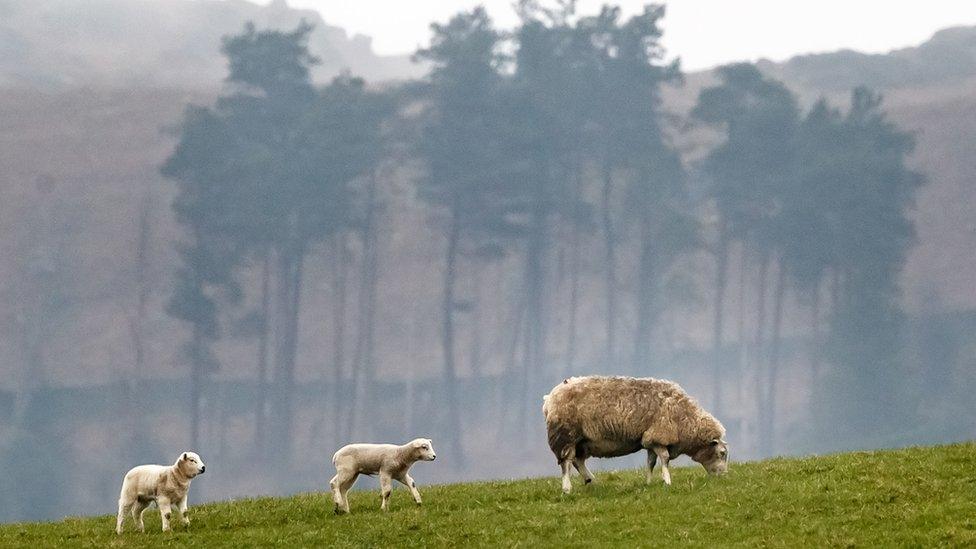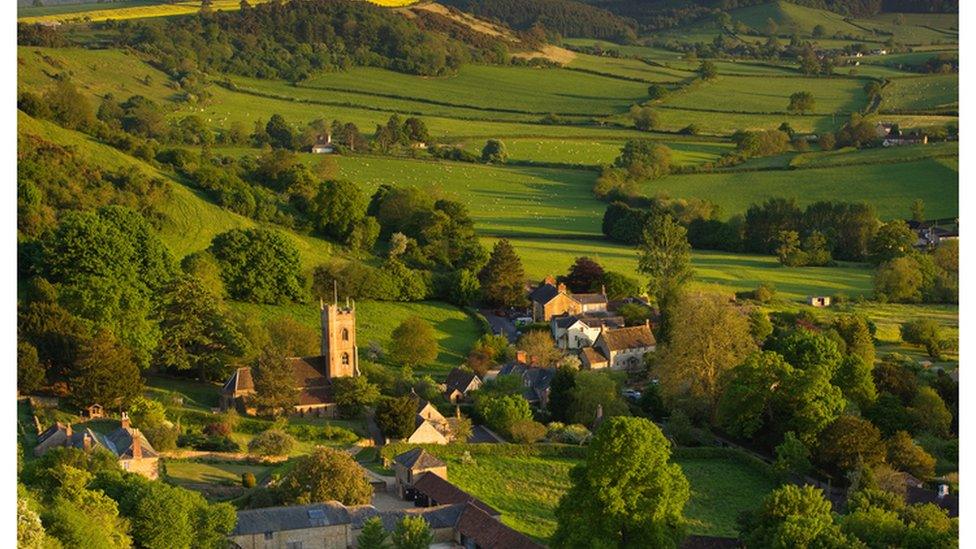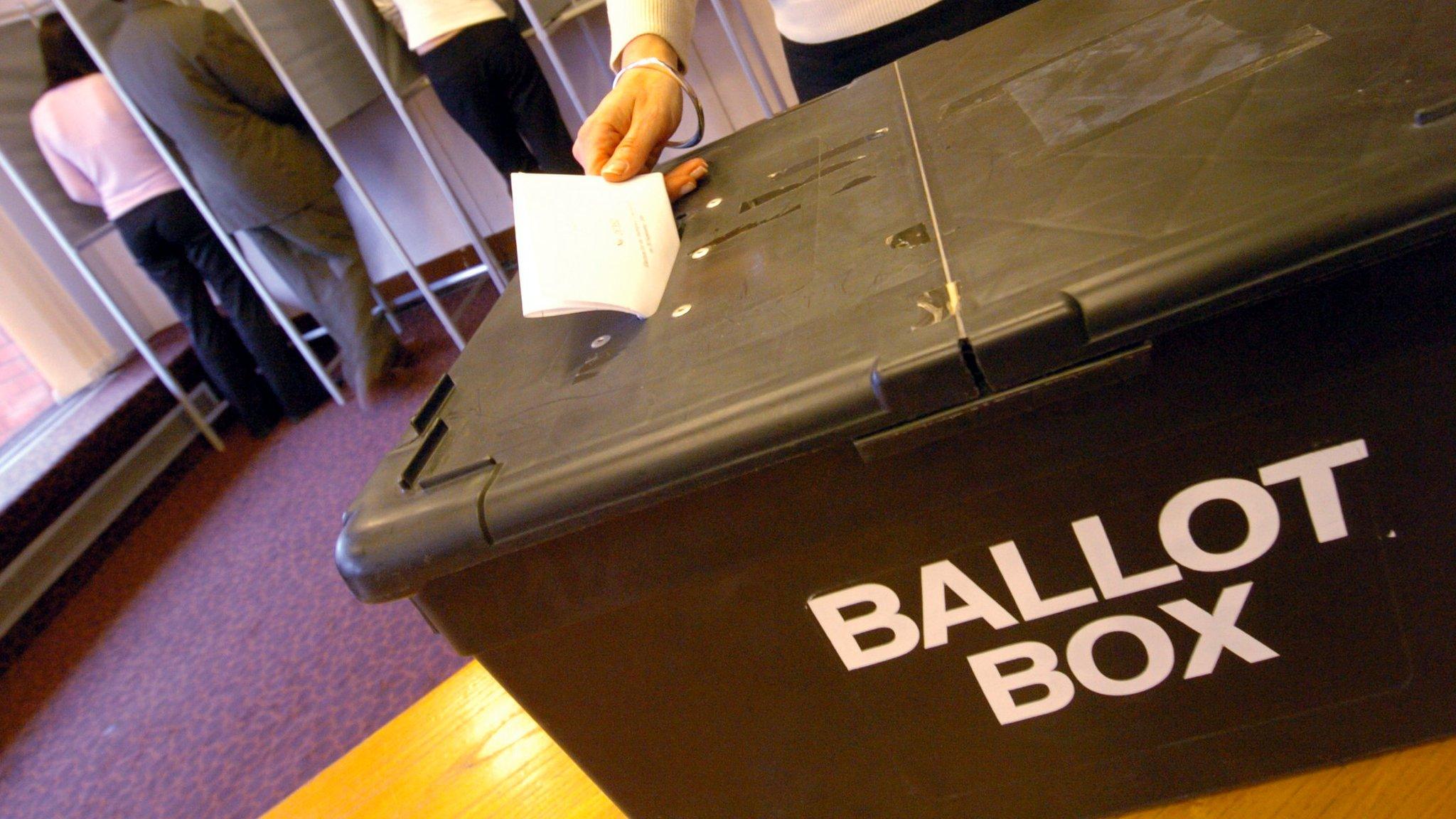Labour promises new respect for countryside concerns
- Published

Labour has pledged to "respect" rural communities after admitting it became "too detached" from their concerns.
Shadow environment secretary Steve Reed said the party recognised that "people who live in the countryside know what's best for the countryside".
The party is promising farmers and landowners access to cheap, clean energy; fewer food imports, and a veterinary agreement with the EU.
The Conservatives accused Labour of "hypocritical political opportunism".
Environment Secretary Steve Barclay dismissed Mr Reed's pitch as [what] "we've come to expect from Sir Keir Starmer's Labour - taking the easy way and just saying what he thinks each audience wants to hear".
He said the party's plans to increase borrowing would drive up inflation and interest rates - including in rural areas.
He also accused Labour of planning to "concrete over their green belt to make space for urban sprawl".
Labour is keen to win over rural voters ahead of a general election expected to be held next year.
According to Ben Cooper, senior researcher at left-leaning think tank the Fabian Society, external, the party currently holds just two out of 124 constituencies in Great Britain that are classified as "village or smaller" - Hemsworth and North Durham.
He says more such seats are held by the SNP and by Plaid Cymru - and fewer than 1% of Labour MPs represent rural constituencies, compared with 28% of the Conservative parliamentary party.
Labour's rural target seats at the next election include Bishop Auckland, Copeland, Workington, Truro and Falmouth, and Clywd West.
Mr Reed told a Country Land and Business Association, external conference in London that, under Keir Starmer's leadership, Labour would "treat our rural communities with respect", in contrast with the years since 2001 when the party last won a majority of rural seats in Parliament.
"We became too detached from the aspirations and concerns of our rural communities. No more," he said.
"That means people from urban areas - like me - not telling people who live and work in the countryside how they should live their lives."
'Restore pride'
Mr Reed claimed Labour would deliver the biggest-ever transfer of power from Westminster to people in all parts of the country, adding: "We want rural communities to control their own futures.
"Choosing the skills, childcare and employment training that suit the needs of their local economy. Choosing how their local buses should be run."
Labour's flagship energy policy, establishing a publicly-owned company called Great British Energy, would channel public and private investment into developing clean power projects in the countryside, he said.
The party has set 2030 as the deadline for when it wants UK electricity production to be fully renewable, and Mr Reed said it would help rural landowners by speeding up the planning process "from years to months" for connecting clean energy projects to the grid.
Some schemes are facing delays of 10 years or more, with Chancellor Jeremy Hunt announcing measures in his Autumn Statement last week to try to speed up connections.
Mr Reed also promised to "cut the red tape" between the UK and the EU to smooth food exports while reducing reliance on imports, the cost of which Labour said had risen by 21% between 2010 and 2022.
"Crippling food inflation, empty supermarket shelves, working people queuing outside food banks all tell us one thing: food security is national security," he told the conference.
The party would get the rural economy "firing on all cylinders" and "restore pride to our countryside", he added.
Tim Bonner, chief executive of the Countryside Alliance, which campaigns on issues including field sports and rural services, said: "It is welcome that both Steve Reed and Keir Starmer are seeking to seriously engage with the countryside for the first time in well over a decade.
"But both have much more to do to persuade rural voters that they will not fold to the significant element of their party which values prejudice over principle on a number of rural issues."
Mr Barclay said the Conservative government was already spending £3.2bn a year on helping farmers to grow the rural economy, and was protecting green spaces by prioritising the building of new homes on brownfield land.
Addressing the same conference in his first major speech since taking over as environment secretary earlier this month, Mr Barclay promised to "champion British agriculture", pledging a further £45m for innovation and automation projects to boost productivity.
- Published22 September 2022

- Published2 October 2023
